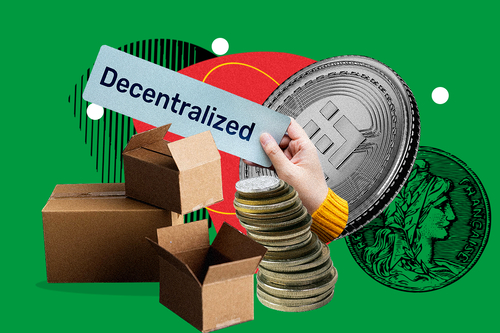

A Guide to Getting Into DeFi on Coinbase
Coinbase is a centralized crypto exchange that offers DeFi options like DeFi coins and the decentralized Coinbase Wallet.
Updated Dec 13, 2021
Many companies on MoneyMade advertise with us. Opinions are our own, but compensation and in-depth research determine where and how companies may appear.
Cypto
Technology
Global Markets
Decentralized finance (DeFi) is taking over the crypto world, and for good reason. While you might assume everything crypto is inherently decentralized, that's not always the case.
Coinbase, for example, is a popular crypto exchange that's run by a centralized company. Yet, they offer many products and services that are considered part of the DeFi world.
Confused? We'll break down everything you need to know about Coinbase's DeFi offerings and how you can branch into the world of DeFi on Coinbase's centralized and user-friendly app.
What is Coinbase?
What is Coinbase?
Coinbase is a popular crypto exchange, which is a marketplace for buying, selling, and trading cryptocurrency. It's the second-largest crypto exchange by volume as of Dec. 2021 (Binance being the first), with over 73 million users and a quarterly trading volume of $327 billion. The exchange supports over 50 different crypto coins and tokens, and it also offers a crypto wallet, a crypto spending card, and crypto loans.
Coinbase
4.3
•
Crypto
What is DeFi?
What is DeFi?
DeFi stands for decentralized finance, and it's a term for blockchain-based financial services and products that operate independently of a central institution. Traditional financial services, such as checking accounts, mortgage loans, or credit cards, are highly centralized—they're administered and controlled by a central organization such as a bank, lender, or credit card company. DeFi services and products, which include many cryptocurrencies, exchanges, crypto loans, crypto wallets, and crypto savings accounts, use blockchain to give consumers direct access to their finances without the use of an intermediary.
The benefits of DeFi are many. For starters, it offers consumers direct control over their finances and full transparency. Security is greater with DeFi services, and they're typically more efficient as well—both faster and cheaper, as you don't have to go through an intermediary that can slow things down and charge unnecessary fees. That said, more centralized financial services can also serve their purpose. They're usually more user-friendly, don't require as much tech knowledge, and may feel safer and more trustworthy to consumers who aren't as familiar with crypto and blockchain.
While crypto and blockchain were built around the principles of decentralization, not everything in the crypto world is fully decentralized. Coinbase, for example, is considered a centralized crypto exchange because it's an institution that acts as an intermediary between you and your crypto. Some crypto coins are also more centralized than others. For example, there are stablecoins that are issued by centralized exchanges (such as Coinbase's USD Coin) and pegged to the US dollar, making them more centralized than DeFi coins like Dai, which is controlled by an open-source algorithm.
Is Coinbase a DeFi exchange?
Is Coinbase a DeFi exchange?
Coinbase is a centralized company and therefore not a decentralized exchange (DEX). Decentralized exchanges are crypto exchanges that don't rely on any intermediaries and instead connect users directly with each other to complete transactions. While many believe decentralized exchanges are the future of trading cryptocurrency, centralized exchanges like Coinbase still have their advantages.
For one, Coinbase is one of the most user-friendly crypto exchanges out there, making it a great option for beginners who don't have a lot of experience using blockchain technology or trading crypto. As one of the most popular exchanges, it's also easy to make trades and buy and sell dozens of different cryptocurrencies, so there's more convenience and liquidity involved in using a centralized exchange like Coinbase. The company has also implemented extensive security measures, and there's a level of reliability associated with these larger, more established exchanges that might make newer users feel safer and more comfortable.
What Coinbase DeFi options are available?
What Coinbase DeFi options are available?
While Coinbase is a centralized crypto exchange, there are still options for participating in DeFi within Coinbase.
Coinbase DeFi coins
Coinbase DeFi coins
Coinbase supports a number of different DeFi coins, so you can buy, sell, and trade them through the Coinbase marketplace. Some supported DeFi coins include Aave (AAVE), Cardano (ADA), Chainlink (LINK), Compound (COMP), The Graph (GRT), Dai (DAI), Polkadot (DOT), and Solana (SOL). Investing in the best DeFi coins is a great way to get some money into the world of DeFi, and Coinbase is one of the best places to buy these coins.
Coinbase DeFi wallets
Coinbase DeFi wallets
Coinbase also offers a DeFi wallet, which is one of the more secure ways to store your crypto. Coinbase Wallet, while offered by a centralized exchange, is decentralized in that it's a self-custody wallet. This means it gives you access to your own private keys and thus full control over your crypto.
When it comes to keeping your crypto in a crypto exchange vs wallet, a wallet is almost always going to be the more secure option. As a DeFi wallet, Coinbase Wallet offers the best of both worlds in that it gives you the convenience of keeping your crypto on an exchange while still letting you control your own keys. Coinbase Wallet also gives users access to the world of decentralized apps and the ability to store non-fungible tokens (NFTs).